Recent headlines graphically illustrate that the United States has yet to discover how to deal with the intersection of free speech and online behavior.
- Elon Musk offered to buy Twitter and promised to reduce the amount of content moderation on the platform.
- An 18-year-old gunman killed 10 people in a Buffalo supermarket and streamed the massacre live online.
- A federal court allowed a new Texas law to go into effect making it illegal for online platforms to block or otherwise edit content.
Elon Musk and Twitter
Elon Musk’s first tweet after Twitter’s board accepted his acquisition offer was, “Free speech is the bedrock of a functioning democracy.” The following day he tweeted, “By ‘free speech’, I simply mean that which matches the law. I am against censorship that goes far beyond the law.”
The law, of course, is rooted in the First Amendment to the Constitution of the United States which constrains government involvement in matters of speech. Aside from obvious offenses such as child pornography and insurrection, the law permits private entities wide latitude in their speech activities. This means, for instance, that digital platforms such as Twitter are free to distribute Russian, Chinese, or Nazi propaganda.
Twitter has long struggled with the responsibility free speech bestows on it. After the 2017 Charlottesville Unite the Right rally resulted in the death of an anti-racism protester, for instance, Twitter removed the account of the American Nazi Party. Mr. Musk’s new “that which matches the law” policy calls attention to how the Nazi party is not illegal—nor is the distribution of the Buffalo video of a white supremacist.
Buffalo’s Live Video
The individual alleged to be the Buffalo killer reportedly wrote of being inspired by the 2019 online shooting spree at a mosque in Christchurch, New Zealand. The vehicle for the Christchurch video was 4chan, a notoriously hate-filled and poorly policed online forum.
“I think that livestreaming this attack gives me some motivation in the way I know that some people will be cheering for me,” the alleged shooter wrote. His platform of choice for the Buffalo video was the Amazon-owned streaming service Twitch. Within two minutes of the posting Twitch responded and took down the stream. But once it is on the internet, content becomes immortal. The shooting video was picked up by users and posted to other platforms.
Twitter, at least for now, has a policy to remove accounts of “individual perpetrators of terrorist, violent extremist, or mass violent attacks.” Yet, ABC News reported, “On Sunday,” the day after the massacre, “clips of the video were still circulating on the platform.”
Texas Freedom of Speech Law
“Freedom of speech is under attack in Texas,” Gov. Gregg Abbott (R-Tex.) has proclaimed. “In Texas, we will always fight for your freedom of speech,” the governor said as he signed into law H.B. 20 “relating to censorship of or certain other interference with digital expression.” The new law, he explained, was in response to “a dangerous movement by some social media companies to silence conservative ideas and values.”
After the U.S. Court of Appeals for the 5th Circuit lifted a lower court’s injunction barring the law’s enforcement, the online industry filed an appeal with the U.S. Supreme Court. The Texas statute, the appeal argues, “strips private online businesses of their speech rights, forbids them from making constitutionally-protected editorial decisions, and forces them to publish and promote objectionable content.”
The law remains in effect while the Supreme Court considers the appeal. In defense of the new law, the Texas attorney general challenged the appeal which now sits with Justice Samuel Alito.[1]
The Trump Factor
There appears to have been a common provocation for both Elon Musk’s comments as well as the Texas law: Donald Trump being banned from Twitter after the January 6 insurrection. “I do think it was not correct to ban Donald Trump,” Musk expounded shortly after announcing his takeover plans, “I would reverse the ban.” It was a similar provocation in Texas. The Austin American-Statesman reported, “H.B. 20 was fueled by conservative anger that coalesced after Twitter banned former President Donald Trump’s account.”
In a fascinating turn of events, Donald Trump made his own form of censorship decision. In order to favor his new social media company Truth Social over Twitter, he has pledged to restrict his use of Twitter. According to a Securities and Exchange Commission filing from Digital World Acquisition Corp., the blank-check stock company that acquired Trump Media & Technology Group for $1.25 billion, the former president is obligated to give Truth Social a six-hour exclusive on his non-campaign posts.
“FIRE!”
The time-honored concept that free speech does not extend to yelling “FIRE!” in a crowded theater has thus far failed to find an online equivalent.
Elon Musk’s intention that Twitter should distribute anything so long as it is legal would seem to be a business plan disguised as an editorial decision. In a pitch deck distributed to potential Twitter investors, Musk promised that he would double the number of Twitter users by 2025, including adding tens of millions of paying subscribers. The model other platform companies have used to accomplish such growth has been dubbed “enrage to engage”—to attract users and keep them coming back by providing non-curated controversy. But if this is his plan, it is surely a foolish one since unmoderated platforms soon become online sewers and repel both users and advertisers.
This brings us to the Texas law and its provision that “a social media platform may not censor a user, a user’s expression, or a user’s ability to receive the expression of another person…” [Section 143A.001 (1)]. Gov. Abbott’s signing statement explained the new law would prohibit social media companies from “banning users based on the users’ political viewpoint.” The alleged shooter’s political viewpoint was reportedly racism and replacement theory. After the Buffalo tragedy, the Texas law’s sponsor, State Rep. Briscoe Cain (R-Tex.), engaged in a Twitter debate to deny his legislation made Twitch’s removal of the shooter’s video illegal. At the very least, the Texas law creates an unconstitutionally vague boundary line between permitted editorial discretion and prohibited viewpoint discrimination.
Elon Musk’s policy is a business decision and a misguided attempt to get more users. The Texas law is a political decision, presumably to get more votes.
Is this the best we can do?
Where Do We Go From Here?
Texas has demonstrated the folly of legislatively prohibiting or excessively burdening editorial discretion.
Elon Musk has demonstrated the relationship between the push for growth and profits and editorial responsibility.
If there is a success post-Buffalo activity, it is how quickly Twitch and other platforms moved to take down the offending video, although the companies need to consider stronger policies that make it more difficult to upload violent videos to begin with. The major platforms moving so quickly to remove the video from their sites was the result of them coming together and acting responsibly.
Following the 2019 Christchurch killings, the major online platforms— Amazon, Facebook, Google, Microsoft, and Twitter – announced the Christchurch Call to Action To Eliminate Terrorist and Violent Extremist Content Online. They developed and implemented a nine-step plan for a Buffalo-like situation.
The Christchurch Call created an industry behavioral code. Undoubtedly, each experience shows how to improve the process further. Unfortunately, however, the good work gets negated by the irresponsible platforms that do not adhere to its principles.
We have seen irresponsible media before in American history. In many ways, the behavior of 21st-century platforms mirrors the profit-pursuing behavior of early 20th-century newspaper barons. William Randolph Hearst and Joseph Pulitzer created what became known as Yellow Journalism with the philosophy of “print whatever it takes to sell newspapers.” In The Constitution of Knowledge: A Defense of Truth, Brookings’s Jonathan Rauch tells the story of how the American Society of Newspaper Editors developed a code of ethics to counter the practice.
Unfortunately, not all platform companies pay attention to their responsibilities to the common good. When this happens in other industries, the government typically steps in. The First Amendment, however, protects against government intervention in editorial decisions. That does not, however, mean the newspaper editors’ model is irrelevant, nor that the government does not have a role.
It is not a violation of the First Amendment for Congress to call for the development of an industry-public-government Christchurch Code-like behavioral standard for all digital platforms.
It is not a violation of the First Amendment for Congress to create a Digital Platform Commission with the power to assemble representatives of the platforms, the public, and the government to establish a behavioral code that the agency would enforce as Sen. Michael Bennet (D-Colo.) and Rep. Peter Welch (D-Vt.) have proposed.
It is not a violation of the First Amendment for the Federal Trade Commission (FTC) to rule that a platform company’s failure to implement a behavioral code is a violation of the prohibitions under the FTC Act. Once such a code is included in the company’s terms and conditions. It constitutes an agreement with the customer that could be enforced by the FTC as unfair or deceptive if not followed (much like the FTC did with its action against Facebook for not following its own privacy code).
It is not a violation of the First Amendment for Congress to require the social media companies to abide by rules of transparency and accountability that are developed in cooperation with industry and enforced by a federal regulatory commission with dispute resolution by an industry self-regulatory body, as Brookings’s Mark MacCarthy has proposed.
It is not a violation of the First Amendment for Congress to move beyond performance politics and for platforms to look beyond profits to wrestle publicly with defining “FIRE!” in the digital theater.
Footnote
[1] After original publication of this item, the 11th Circuit Court of Appeals maintained a lower court’s injunction against a similar law in Florida. The court found, ‘their so-called ‘content moderation decisions constitute protected exercises of editorial judgement.”
Amazon, Facebook, Google, and Microsoft are general, unrestricted donors to the Brookings Institution. The findings, interpretations, and conclusions posted in this piece are solely those of the authors and not influenced by any donation.
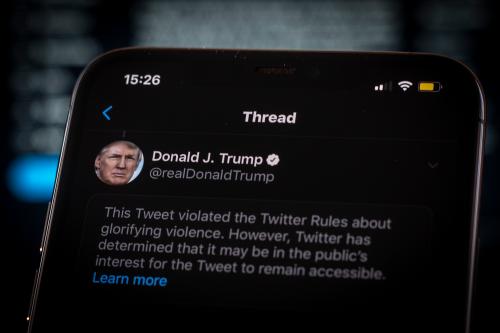
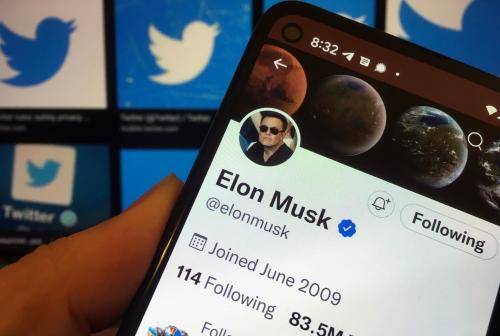
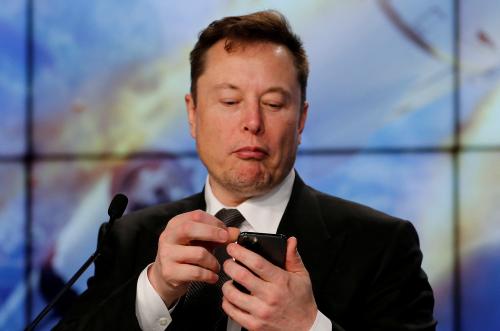

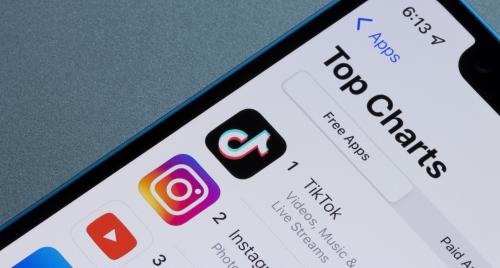
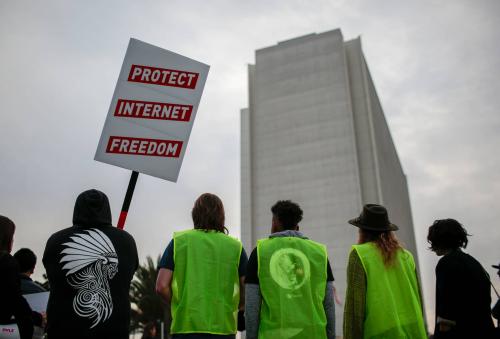

Commentary
Elon Musk, the Buffalo shooting, Texas, and Internet free speech
May 23, 2022